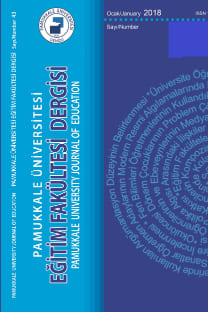İlköğretim Öğrencilerinin Isı ve Sıcaklık Konularını Kavrama Düzeyleri Üzerine Bir Araştırma
Bu çalışma, ilköğretim öğrencilerinin ısı ve sıcaklık kavramlarını anlama düzeylerini ve bunun kalıcılığını belirlemek amacıyla yapılmıştır. Bu amaçla öğrencilerin hem günlük yaşamdaki olaylarla bağlantı kurarak, hem de teorik bilgilerini kullanarak cevaplayabilecekleri sorular içeren bir tamlayıcı (diagnostik) test hazırlanmıştır. Bu test, ilköğretim 4, 5, 6, 7 ve 8. sınıf öğrencilerine uygulanmıştır. Sonuçlar incelendiğinde öğrencilerin günlük yaşamda karşılaşabilecekleri olaylarla ilgili soruları teorik bilgi gerektiren sorulara oranla cevaplamada hem daha fazla istekli ve hem de daha başarılı oldukları tespit edilmiştir. Bu bulgular sonucunda etkili bir fen eğitimi yapılabilmesi için bazı önerilerde bulunulmuştur.
A Study on Primary Students' Conception Level of Heat and Temperature
This study was carried out in order to determine the primary students' understanding level and stability of the knowledge of heat and temperature. For this purpose, a diagnostic test was designed in order to test both students' understanding and application of these knowledge into everyday life. This test was applied to 4, 5, 6, 7 and 8th grade primary school students. The results demonstrated that students were more successful and willing to answer the questions related to everyday life rather than theoretical questions. In the light of these findings some suggesstions have been made.
___
- A. G. Harrison, A. J. Gayson ve D. F.. Treagust, Investigation a Grade 11 student's Evoluting Conceptions of Heat and Temperature, Journal of Research in Science Teaching, 36, 55-87, 1999.
- D. P. Ausubel, Educational Psychology: A Cognitive View. New York: Holt, Rinehort and Winston, 1968.
- E. Engel, The development of understanding of selected aspect of pressure, heat, and evolution in pupils aged between 12-16 years. Basılmamış Doktora Tezi, University of Leeds, 1982.
- E. E. Clough, ve R. Driver, Secondary Students' Conceptions of the Conduction of Heat: Bringing Together Scientific and Personal Views. Physics Education, 20, 176-182, 1985.
- E. L. Lewis ve M. C. Linn, Heat Energy and Temperature Conceptions of Adolescents, Adults and Experts: implications for Curricular improvements. Journal of Research in Science Teaching, 31, 657-677, 1994.
- E. Şenocak, M. Sözbilir, R. Dilber ve Y. Taşkesenligil, İlköğretim fen öğretiminde demonstrasyonlar ve öğrencilerin soru yazma tekniğinden yararlanma üzerine bir çalışma, Çukurova Üniversitesi Eğitim Fakültesi Dergisi, 23, 26-32, 2002.
- G. L. Erickson, Children's Conceptions of Heat and Temperature. Science Education, 63, 221-230, 1979.
- G. L. Erickson, Children's Viewpoints of Heat: a second Look. Science Education, 323-336, 1980.
- H. Pfund, ve R. Duit, Students Alternative Frameworks and Science Education (Kiel: Institute for Science Education), 1994.
- J. M. Rogan, Development of a Conceptual Framework of Heat, Science Education, 72, 103-113, 1988.
- M. F. Thomaz, I. M. Malaquias, M. C. Valente, ve M. J. Antunes, An Attempt to Overcome Alternative Conceptions Related to Heat and Temperature. Physics Education, v30 nl l9-26, 1995.
- M. K. Summers, Teaching heat - and analysis of misconceptions. School Science Review, June, 671-675, 1983.
- M. Sozbilir, A study of undergraduates' understanding of key chemical ideas in thermodynamics, Basılmamış Doktora Tezi, University of York, York, UK, 2001.
- P. J. Fensham, R. F. Gunstone, ve R. T. White, The Content of Science: A Constructivist Approach to its Teaching and Learning (London: Palmer), 1994.
- R. Maskill, Pupils' questions, alternative frameworks and the design of science teaching. Int. J. Sei. Educ. 19, 781-799, 1997.
- R. Driver, and B. Bell, Student's thinking and Learning of science: a constructivist view. School Science Review, 67,443-456, 1986.
- S. Mak and K. Young, Misconceptions in teaching of heat, School Science Review, Mar, 464-470, 1987.
- ISSN: 1301-0085
- Yayın Aralığı: Yılda 3 Sayı
- Başlangıç: 1996
- Yayıncı: -
Sayıdaki Diğer Makaleler
Teaching History and the Nature of Science in Science Teacher Education Programs
İlköğretim Öğrencilerinin Isı ve Sıcaklık Konularını Kavrama Düzeyleri Üzerine Bir Araştırma
Mustafa SÖZBİLİR, Refik DİLBER, Erdal ŞENOCAK, Yavuz TAŞKESENLİGİL
Fen Eğitiminde Kavram Haritaları
Fen Derslerinde Alternatif Kavramların Araştırılmasının Önemi: Kuramsal Bir Yaklaşım
